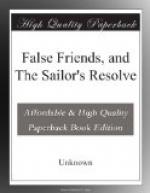“There’s no use in making the worst of matters,” said he; “what’s done can’t be helped; and my debts, such as they are, won’t ruin a rich man like my father.”
“It is not that which I fear,” said the mother faintly, with a terrible consciousness that her son,—her hope, her pride, the delight of her heart,—had entered on a course which, if persevered in, must end in his ruin both of body and soul. “I tremble at the thought of the misery which you are bringing on yourself. These men are making you their victim: they are blinding your eyes; they are throwing a net around you, and you have not the resolution to break from the snare.”
“They are very pleasant, jovial fellows!” cried Philip, trying to hide under an appearance of careless gaiety the real annoyance which he felt at the words of his mother.
“I’ve asked them to dine here to-day and—”
“I shall not appear at the table,” said Lady Grange, drawing herself up with dignity; “and if your father should arrive—”
“Oh! he won’t arrive to-night; he never travels so late.”
“But, Philip,” said the lady earnestly again laying her cold hand on his arm. She was interrupted by her wayward and undutiful son.
“Mother, there’s no use in saying anything more on the subject; it only worries you, and puts me out of temper. I can’t, and I won’t be uncivil to my friends;” and turning hastily round, Philip quitted the apartment.
“Friends!” faintly echoed Lady Grange, as she saw the door close behind her misguided son. “Oh!” she exclaimed, throwing herself on a sofa, and burying her face, “was there ever a mother—ever a woman so unhappy as I am!”
Her cup was indeed very bitter; it was one which the luxuries that surrounded her had not the least power to sweeten. Her husband was a man possessing many noble qualities both of head and heart; but the fatal love of gold, like those petrifying springs which change living twigs to dead stone, had made him hardened, quarrelsome, and worldly. It had drawn him away from the worship of his God; for there is deep truth in the declaration of the apostle, that the covetous man is an idolater. It was this miserable love of gold which had induced Sir Gilbert to break with the family of his wife, and separate her from those to whom her loving heart still clung with the fondest affection. Lady Grange yearned for a sight of her early home; but gold had raised a barrier between her and the companions of her childhood. And what had the possession of gold done for the man who made it his idol? It had put snares in the path of his only son; it had made the weak-minded but head-strong youth be entrapped by the wicked for the sake of his wealth, as the ermine is hunted down for its rich fur. It had given to himself heavy responsibilities, for which he would have to answer at the bar of Heaven; for from him unto whom much has been given, much at the last day will be required.




